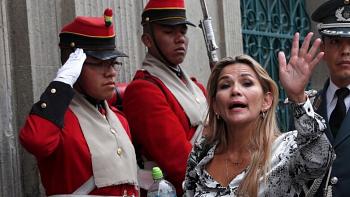Canada hesitates to recognize Bolivia's new president
The sudden assumption of Bolivia's presidency by a conservative politician previously unknown outside her country has presented Canada with a quandary.
Jeanine Añez says she has taken power because of "the need to create a climate of social peace in the country" following the flight of President Evo Morales into exile in Mexico after an election plagued by allegations of fraud.
As of Wednesday evening, neither Global Affairs Canada (GAC) nor the Bolivian Embassy appear to have decided whether to publicly recognize Jeanine Añez, who already is performing the functions of president in La Paz with the support of the country's armed forces and police.
The controversial figure claimed constitutional legitimacy for her inauguration based on her title as vice-president of the Senate, although her nomination occurred in a Congress that lacked a quorum due to a boycott of proceedings by pro-Morales legislators.
Her proclamation was immediately rejected by left-leaning governments in the region, including those of Cuba and Venezuela, but recognized by the governments of the two most populous countries in the hemisphere: the Trump administration in the United States and the Bolsonaro government in Brazil.
While some Bolivian embassies, such as the one in Berlin, continued to display photographs of Evo Morales as president on their website banners, the Bolivian embassy in Ottawa did not. When CBC News visited the embassy Wednesday morning, an official said the mission was still functioning but "we have no comments" on the constitutional situation in Bolivia.
'New elections in January'
Meanwhile, Canada raised the status of its travel advisory for the Andean nation Wednesday morning to warn Canadians there to "avoid non-essential travel ... due to political uncertainty, nationwide protests, roadblocks and civil unrest."
Añez described herself as an interim president whose goal was to hold new elections as soon as possible; she suggested a date of Jan. 22.
Añez's supporters base her claim to legitimacy on Bolivia's constitution, under which the president of the Senate is third in line to the presidency. After Morales and Vice-President Alvaro Garcia Linera fled to Mexico, Senate President Adriana Salvatierra (also of the ruling party) sought refuge in the Mexican Embassy in La Paz and resigned her seat.
Añez said this leaves her as the next in the line of succession. But that claim was complicated Wednesday afternoon when Salvatierra, who outranks Añez in the constitutional order of succession, left her sanctuary in the Mexican embassy and reappeared, with supporters in tow, at the doors of the Senate, demanding to be sworn in as president.
Moreover, not all countries that accused Morales of electoral fraud are convinced of the legitimacy of Añez's assumption.
Canada has no position yet
Canada, which has pursued a more active policy in Latin America under the Trudeau government, sent two forensic specialists to Bolivia in the last week of October to help with an audit of the first round of voting held under the auspices of the Organization of American States.
After the audit team reported back that it had found serious manipulation of the vote count, Canada called for a second round of voting and insisted that it be cleaner.





